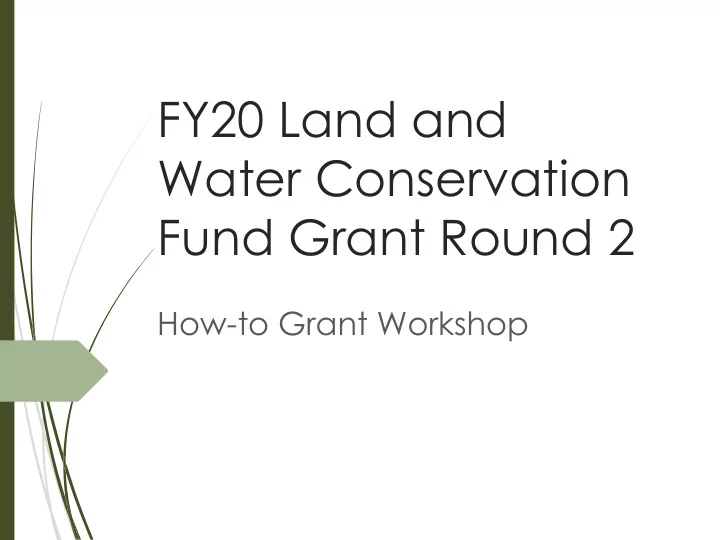

FY20 Land and Water Conservation Fund Grant Round 2 How-to Grant Workshop
SCORP LWCF grants will be used to implement the findings of SCORP Four SCORP goals are: 1. Access for Underserved Populations 2. Support the Statewide Trails Initiative 3. Increase the Availability of Water-based Recreation 4. Support the Creation and Renovation of Neighborhood Parks
Requirements for All Projects Municipal applicants must have a current Open Space and Recreation Plan (if one is already on file at DCS, don’t send another) It is possible to submit it at the same time as the grant application Acquisition projects must have an appraisal done to Yellow Book standards Applications are due by March 31, 2020 at 3:00 pm at our Boston office
Appraisals Acquisition projects must have an appraisal done to Yellow Book standards Appraisal deadline is May 1, 2020, but a signed notice to proceed with a yellow book certified appraiser must be included with the application package Appraisal must be no older than one year old at the time of the grant submission (dated between April 1, 2019 and March 31, 2020) Statement of Work must be completed by the appraiser – Attachment F in LWCF BID package
Eligible Project Types Conservation projects: Purchase land in fee simple or conservation restriction Land will be under the care and control of the Conservation Commission Recreation projects: Purchase recreation land Develop new recreational facilities Renovate existing parks Land must be dedicated as parkland
Eligible Project Types Trails projects: Development of trails on existing municipally- or state-owned conservation or recreation land Projects on state land must be submitted by DCR or DFG, not by the municipality in which they are located Federal definition of trail: A trail is a pedestrian route developed primarily for outdoor recreational hiking purposes. A pedestrian route provided primarily to connect elements, spaces, or facilities within a site is not a trail.
Eligible Project Costs For acquisition projects: Reimbursement is based on purchase price or appraised value, whichever is less Other items, such as title searches, legal fees, and surveys may also be eligible For renovation/development projects: Engineering Design (grants solely for design are not eligible) Construction Construction supervision
Eligible Project Costs For trail projects: Development and marking of trails We cannot reimburse for donations or in-kind services Must have 100% appropriated from municipal budget (for municipalities), 100% from state budget (for state agencies)
Reimbursement Percentage LWCF grants have a set 50% reimbursement rate, up to the $750,000 grant maximum The specific reimbursement rate for a successful project will be based on what percentage the grant award is of the total eligible project cost Example: $3,000,000 project with a $750,000 grant award $750,000 is 25% of $3,000,000 All reimbursement requests will reimburse grantee 25% of eligible project costs A grantee submitting $100,000 worth of invoices will be reimbursed $25,000 (25% of $100,000 is $25,000) Plan your project budget accordingly
Selection Process All projects are visited by DCS staff, then rated and ranked (rating system is included in the application package) Recommendations are approved by EEA Recommendations are approved by the National Park Service Anticipated state grant decision announcement date is late spring 2020 (this is an estimate) Anticipated federal grant award announcement date is summer 2020 (this is an estimate) Project completion date will be June 2021 for acquisition projects, June 2022 for construction projects
Municipal Votes All municipal projects must have a town meeting or city council vote The vote will: Authorize the submission of the grant application Approve appropriation of 100% of the total project cost Dedicate the land to recreation (Chapter 45, Section 3 or 14) or conservation purposes (Chapter 40, Section 8C) Sample vote language is in application package Send all draft vote language to me for approval Vote can occur after application deadline, but must occur before end of the calendar year
Project Description Become familiar with the rating system and make sure that your project description hits on all of the areas where your project can receive points (2 pages max, 11 pt font, ¾” margins) Relevance to statewide and local plans, including SCORP Climate resiliency Accessibility Environmental Justice Expansion of recreational resources, including hunting and wildlife viewing Environmental education Stewardship
Post-completion Responsibilities All sites that receive LWCF funding are protected by both Article 97 and Section 6(f)(3) of the LWCF Act, which means the land must remain as conservation or recreation land in perpetuity Site must be open to all – this includes both non-residents and the handicapped Fair fee policy Sign requirements
Important Things to Remember LWCF is funded through the National Park Service and is subject to its approval, as well as federal rules and regs Division of Conservation Services administers the program for NPS Any work completed prior to receiving a signed state contract is ineligible for reimbursement Make sure to use the Land and Water Conservation Fund application package , not the LAND or PARC applications
Other Things to Remember Please use binder clips to fasten applications together – no binders, folders, plastic sleeves, etc. We require one original and two copies – make it clear which are the copies Double-sided copies please Clearly mark all attachments and use the application form as an attachment checklist Maintain the format of the application form Focus on the big picture – if one thing is filled in incorrectly, the application will (most likely) still be eligible
Contact Information Melissa Cryan 100 Cambridge Street, 9 th Floor Boston, MA 02114 (617) 626-1171 melissa.cryan@mass.gov www.mass.gov/grant-programs-offered-by-the- division-of-conservation-services www.nps.gov/lwcf
Recommend
More recommend